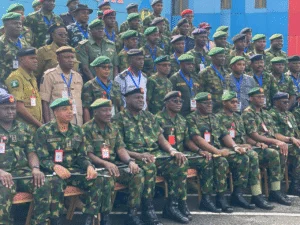The Chief of Training (Army), Maj.-Gen. Sadiq Ndalolo, has called for the strengthening of operational planning processes, improved inter-agency coordination, and the adoption of modern technology to effectively counter emerging security threats across the country.
Maj.-Gen. Ndalolo made the call in Abuja on Tuesday during the opening of the 2025 Operations Planning Cadre, organised by the Army Headquarters Garrison for selected officers drawn from various security agencies.
The event, themed “Integrated Mission Planning: The Roles of MDAs in Enabling Proactive Solutions to COIN Operations in the FCT”, aims to enhance collaboration and planning efficiency in counter-insurgency operations within the Federal Capital Territory (FCT).
Represented by the Deputy Chief of Training, Linkages and Integration, Maj.-Gen. Ifeanyi Otu, the Chief of Training underscored the importance of information sharing and civil-military cooperation in combating insecurity.
He explained that the forum was designed to deepen understanding of joint operational planning and inter-agency collaboration as part of efforts to address the country’s evolving security challenges.
According to him, “Effective counter-insurgency requires a comprehensive approach that integrates the efforts of ministries, departments and agencies alongside the armed forces and other security agencies.
“Each stakeholder has a vital role to play — from intelligence gathering, humanitarian support, and infrastructure development to rehabilitation and reintegration of affected communities.
“This collaborative effort is what ensures lasting peace and stability; the FCT as a seat of national power demands special attention and proactive planning to forestall any form of insurgent activity.
“It is therefore imperative that we strengthen our operational planning processes, improve inter-agency coordination, and leverage technology, information sharing, and civil-military cooperation to stay ahead of the emerging threats,” he said.
Ndalolo urged participants to fully engage with facilitators, share experiences, and translate the knowledge gained from the cadre into practical operational strategies.
Earlier, the Commander, Army Headquarters Garrison, Maj.-Gen. Maxwell Dangana, stressed that no single security service could effectively address the nation’s security challenges in isolation.
He noted that, “Every service has its own role in national security, and to succeed, security agencies must work together.”
Dangana emphasized the crucial role of operational planning in the success of military and security operations, adding that the cadre was designed to refresh and enhance participants’ skills in operational art and campaign planning.
“The training is also designed to improve participants’ ability to think critically, anticipate potential obstacles, and develop innovative and achievable courses of action to accomplish operational objectives in joint and single operations,” he explained.
He further stated, “If we have to work together, it means we have to exercise together; if we have to exercise together, it means we have to train together, and if we have to train together, it means interaction between us must be innovative.
“As we gather here today, it is crucial to recognise the ever-evolving nature of warfare and the challenges we are constitutionally saddled with. Our adversaries are becoming increasingly evasive, innovative, and sophisticated, but we must adapt accordingly and neutralise them completely.”
Dangana reaffirmed the Army’s commitment to continuous capacity building and realistic training, noting that seasoned facilitators and resource persons had been engaged to ensure a highly interactive and impactful programme.


